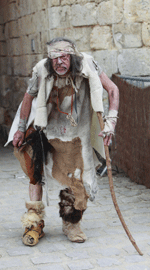Erik Ullestad–West Des Moines, IA
Warm-up Question
What’s the sickest you’ve ever been? How were you treated for your illness?
Ending Leprosy
World Leprosy Day was recently observed on Sunday, January 25. Though this disease has a known cure, over 200,000 new cases are diagnosed every year. Many people are not able to access the multi-drug therapy required to treat leprosy.

Leprosy, also called Hansen’s disease, is caused by slow-multiplying bacteria that incubate for up to five years. Symptoms of leprosy include painful skin lesions and growths; thick, stiff, or dry skin; muscle weakness and paralysis; enlarged nerves; eye problems; and ulcers on the bottom of feet. Complications can arise that result in other physical deformities such as the loss of fingers and toes.
The majority of people afflicted with leprosy live in places that have enacted laws which discriminate against people with the disease. In India, for example, there are fifteen laws that target people with leprosy – including preventing them from holding public office or obtaining a driver’s license. Laws in Thailand and Nepal place restrictions on employment and marriage for people with leprosy. Through the efforts of World Leprosy Day, the World Health Organization hopes to remove the social stigmas associated with this disease in order that more people will be diagnosed and cured.
Discussion Questions
- Did you know what leprosy was before reading the article?
- How might this illness affect a person’s ability to live a normal life?
- Why do you think leprosy continues to spread even though it’s completely curable?
- If you were to get sick with something like leprosy, how would you go about being treated?
Sixth Sunday after Epiphany
(Editor’s note–This week we depart from the lectionary’s observance of Transfiguration.)
(Text links are to Oremus Bible Browser. Oremus Bible Browser is not affiliated with or supported by the Evangelical Lutheran Church in America. You can find the calendar of readings for Year B at Lectionary Readings
For lectionary humor and insight, check the weekly comic Agnus Day.
Gospel Reflection
The second half of Mark’s first chapter is all about healing. Early on we see that Jesus has both the power and the ability to make people whole. These miracles not only gave hope to the people who were healed, it also put Jesus in the precarious position of being in the spotlight.
In today’s story of the cleansing of the leper, we see that it is the man’s faith in Jesus that opens the door to his healing. Yet it is Jesus who chooses to cleanse the man of leprosy. By removing the leprosy, Jesus also removes the social stigma that came with it. Leprosy is a highly contagious disease. In those days the only way to prevent the spread of leprosy was to isolate people with the disease. They were cast off from their friends, family, and religious community. A leper lived a painful, shameful, and lonely life. Imagine the immense joy felt by this man who was healed by Jesus.
Jesus instructed the cleansed leper to do two things – (1) don’t tell anyone, and (2) present yourself to the priest. At this point in time Jesus was already starting to become overwhelmed with the crowds that were following him. These large gatherings may have been somewhat inconvenient, but they also presented a security risk for Jesus. The more his popularity grew, the more likely it was that government and religious leaders would see him as a threat. Jesus was attempting to keep the crowds small while also telling the religious leaders that he comes in the name of the same God they believe in.
It’s not surprising to read that the man couldn’t keep this news to himself. How can someone keep quiet when their life has been forever changed?! The man told everyone who would hear, which made life more difficult for Jesus. He would continue his ministry of healing and teaching, but it was a very different existence from then on.
Discussion Questions
- Have you ever seen a miracle happen to someone?
- When have you felt desperate for healing or change in your life?
- How would you respond to Jesus’ healing if you were a leper?
- Why do you think Jesus wanted the man to not tell anyone?
Activity Suggestions
Hospitals and nursing homes are filled with people in need of healing – and not just the kind of healing that comes from doctors and medicine. Contact a local residential care facility and ask how your group might help bring hope to their residents. This might be a musical performance, a skit, a worship service, Bible study, or playing board games. Be sure to talk with your group before your outing about how to appropriately interact with aging, ill, or disabled people. Encourage them to be agents of Christ’s love through their words and actions.
Closing Prayer
God of hope, help us trust in your power to heal us. Give us confidence to show your love and compassion to those in need. Amen.
